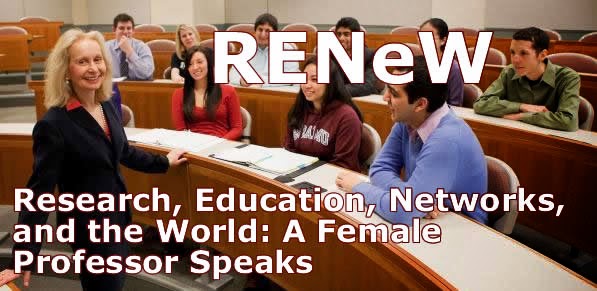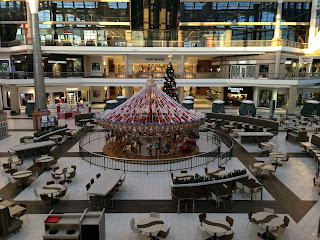The message came from Mary Magrogan, the INFORMS Director of Membership, Subdivisions, and International Programs, in mid-September, asking me whether I would be able to speak at the University of Alabama sometime in November. A request had come from the INFORMS Student Chapter there through the INFORMS Speakers Program, which I am a huge fan of (and we, at UMass Amherst, have also availed ourselves of
this wonderful program). INFORMS covers the cost of travel (if needed) and the host covers on-site expenses, including overnight lodging, if necessary,
Even though I am more than the usual "busy," since I am also chairing a faculty search in my department, I very quickly agreed to this kind invitation and the date for scheduled talk was this past Friday, November 17. This would be my first time in Alabama, and the
Department of Information Systems, Statistics and Management Science at the Culverhouse of Commerce has such distinguished faculty, that I was very excited about this speaking engagement and visit. Plus, I am a huge proponent of INFORMS Student Chapters, and wanted to support the University of Alabama one.
My amazing host was Dr. Karthik Murali, who is now the Faculty Advisor to this INFORMS Student Chapter. Dr. Burcu Keskin had served previously in this capacity for 10 years. Dr. Murali not only drove me from Birmingham to Tuscaloosa and then back to the airport but also arranged for a very rich visit and experience.
Below is a photo of Dr. Murali with the Alabama INFORMS Student Chapter officers.
I had the pleasure of having breakfast with Dr. Murali Friday morning at the Hyatt Regency in Birmingham, which I highly recommend.
My schedule included meetings with faculty and another highlight was a one hour meeting with several officers of the University of Alabama Student Chapter. I very much enjoyed hearing from the students the kind of research that they are doing and to answer their question, which ranged from selection of research topics to time management. I loved their enthusiasm and energy!
Then it was time for my talk and, amazingly, some of the students had anticipated what I might mention in my presentation.
I have posted my slides here. Usually, when I am asked to give a presentation I will provide a list of topics and ask the host to select one; cybercrime and cybersecurity was the winner! The audience had fabulous questions, which will lead to more research on this very timely topic.
Then it was time for lunch and, would you believe, while it was cold and rainy back in Amherst, Massachusetts, we got to dine al fresco at The River Restaurant with a great view and even better food!
The lunch with Dr. Burcu Keskin, Dr. Sharif Melouk, and Dr. Mesut Yavuz was simply fabulous!
Afterwards, I could not resist being photographed against a backdrop of red roses with Dr. Keskin.
I have known Dr. Keskin for quite a while now, since she is a contemporary of my former doctoral student, Dr. Tina Wakolbinger, and both of them received the INFORMS Judith Liebman Award! In fact, they wrote the document on how to run a successful student chapter. They are true leaders in the profession now.
There was no time for a tour (and the U. of Alabama was getting ready for another football game) but I did get to see the Dean's boardroom and room next door, both of which were so elegant.
I give many talks but believe that this is the first time I have seen multiple chandeliers in a Business School!
A big shoutout also to the MIS faculty, some of whom are in the photo above, for taking the time to speak with me on their multiple exciting initiatives in cybersecurity! And, of course, it was special to hear them mention some of my MIS colleagues at the Isenberg School.
Although I did not get a chance to see Dr. Jim Cochran (who is now an Associate Dean) and was recently elected an INFORMS Fellow, as well as Dr. Emmett Lodree, who was out of town, I felt that they were there with me "in spirit."
Many thanks also to Dr. Mesut Yavuz, Dr. Nick Freeman, and Dr. John Mittenthal (who is the academic grandson of the one and only Professor George Dantzig, and his advisor at the U. of Michigan was Dr. John Birge, the new Editor of
Operations Research) for taking the time out of their very busy schedules to meet with me individually. This department is interviewing candidates for 7 faculty positions and they also, like UMass Amherst, have this week off as a Thanksgiving holiday break.
The journey to the airport took a while because of the traffic. It was interesting to see the Charlotte airport at 10PM packed with travelers (my connection from Birmingham) and I arrived back in Amherst at 1:30AM Saturday morning.
A BIG thanks to Dr. Karthik Murali, to his colleagues, to the University of Alabama INFORMS Student Chapter, and to the INFORMS Speakers Program for such a delightful visit and speaking engagement.
And, I leave you with a photo that I took early Friday morning of the Galleria Mall that was attached to the hotel, complete with a festive carousel and holiday decorations.
Happy Thanksgiving, everyone, and safe and enjoyable travels!
And, one day, I may blog on a fascinating international businesswoman from Alabama that I sat next to on my flight from Charlotte to Birmingham. We had such an amazing conversation that we exchanged hugs upon departure.










































































